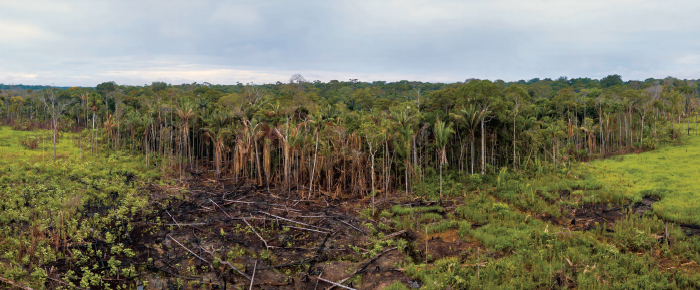
Money laundering is a process in which profits obtained from illicit activities are integrated into the legal financial system. This phenomenon does not just affect the economy but it also has a devastating impact on the environment.
Illegal activities such as mining, deforestation and the trafficking of dangerous waste are closely linked to money laundering and cause serious environmental damage. Latin America is facing a significant deficiency in its legislation and the enforcement of laws against environmental crimes. Although there are legal thresholds in some countries, the lack of resources and corruption impede their effective enforcement.
Interpol has outlined that the illegal trade of plastic waste is related to other serious crimes, including money laundering.1
In the case of Peru, the import of plastic waste has caused serious environmental problems due to the lack of traceability and controls on these imports.
In Chile, companies such as Bo Packaging were denounced for environmental contamination due to inadequate handling of plastic waste.2 Despite protests from citizens and sanctions being imposed, the lack of strict supervision has allowed these practices to continue.
In Mexico, the situation is similar. Companies, such as Clearpac, operate without the necessary environmental permits and are causing health problems in nearby communities.3
Contaminating Companies
Transnational companies play a crucial role in environmental contamination in Latin America. U.S. and European companies export plastic and other waste to Latin American countries, taking advantage of lax regulations.
This waste is often processed inappropriately, diffusing toxic substances into the air, water and ground.
The Free Trade Agreement in Mexico
The implementation of free trade agreements, such as the North American Free Trade Agreement (NAFTA), has had a mixed impact on environmental regulation in the region. On the one hand, these treaties have incentivized economic growth and trade, but on the other hand, they have facilitated the entry of companies that operate without considering their environmental impact. In many cases, prioritizing foreign investment has led to weak environmental regulations.
For example, NAFTA enabled a significant increase in direct foreign investment in Mexico but also incentivized many industries to operate with lower environmental standards than those applicable in their own countries. This has resulted in the proliferation of polluting industries that exploit natural resources without sufficient mitigation and control measures. The lack of robust regulation and the weaknesses in enforcing environmental laws have exacerbated these problems, causing severe ecological damage and affecting the health of local communities.
Between 2012 and 2022, the country imported more than 845,700 tons of plastic waste, much of which was acquired by around 2,000 companies.4 These activities do not only contaminate the environment but are also linked to criminal practices such as the use of false documents and the avoidance of fiscal responsibilities.
The Texaco-Chevron Case in Ecuador
The Texaco-Chevron case in Ecuador is a significant example of how the actions of big corporations can have devastating effects on the environment. Between 1960 and 1990, Texaco (now part of Chevron) operated in the Amazon region of Ecuador, extracting petroleum without considering basic environmental protection regulations. The company poured millions of gallons of toxic waste and crude oil into rivers and the ground, seriously affecting the indigenous communities and the region's biodiversity.
Despite attempts to bring legal action against Chevron, the company has managed to evade legal and financial responsibilities, using prolonged legal tactics and political influence to avoid being fined. This case underlines the need for a much stronger international legal standard that can hold trans-national companies responsible for their environmental actions, especially in countries with weaker legislation and limited resources for environmental protection.
Corruption
Illegal deforestation is another activity that significantly contributes to money laundering in Latin America. Entire forests are illegally removed to obtain wood, which is then sold on national and international markets.
This practice does not just destroy natural habitats and contribute to climate change, but it also facilitates money laundering through the falsification of documents and corruption.
In countries like Peru and Bolivia, illegal deforestation is linked to corruption networks that involve civil servants and businesspeople. These networks use fictitious companies to legalize the wood they have obtained illegally and launder the profits through complex financial transactions.
The lack of effective regulation and the complicity of local authorities worsen the problem, allowing uncontrolled deforestation to continue.
Conclusion
Money laundering through illegal activities has a devastating impact on the environment in Latin America. The lack of effective laws and the prevalence of corruption allow these practices to continue in an uncontrolled manner.
It is crucial that the region’s governments strengthen their legal frameworks and improve law enforcement to protect the environment and the health of their citizens. Companies should also take responsibility for adopting more sustainable practices in order to mitigate their environmental impact.
César Fabricio Fúnez Martínez, CAMS
- “Interpol report alerts to sharp rise in plastic waste crime,” Interpol, August 27, 2020, https://www.interpol.int/News-and-Events/News/2020/INTERPOL-report-alerts-to-sharp-rise-in-plastic-waste-crime
- Jorge Molina Alomar, “Pact for Plastics in Chile starts out with seven companies and four goals defined for 2025,” País Circular, April 16, 2019, https://www.paiscircular.cl/industria/pacto-por-los-plasticos-en-chile-parte-con-siete-empresas-y-cuatro-metas-definidas-para-el-ano-2025/
- “Learn about the main environmental problems in Mexico and how to help reduce them,” Horacio Guerra, March 29, 2023, https://horacioguerra.com/problemas-ambientales-en-mexico/
- Mónica Cerbón, “Companies that import plastic waste to Latin America have been denounced for environmental damage,” OJO PÚBLICO, February 12, 2023, https://ojo-publico.com/4244/importadoras-basura-plastica-denunciadas-por-danos-ambientales










